Campfire Safety Tips for the Summer Season
Summer is officially here. Days filled with inspiring sunrises and sunsets, beaches, hikes… it’s a much-anticipated, incredible time in the PNW. This year, recreating and camping are certainly different, but one quintessential summer activity remains: enjoying a campfire.
Whether it’s in your backyard or on public lands, having a campfire is a fun experience if you do it safely! With a big holiday weekend just around the corner, we checked in with our friends at Washington State Department of Natural Resources (DNR) to get the 411 on what having a responsible campfire looks like.
You’re going camping for the first time and you’re really excited, especially for the campfire! What are the top three things that you need to know before you go?
- Never light a campfire until you check for any burn restrictions.
- Use already existing fire pits, don’t build your own.
- Never walk away from a smoldering fire. Always put it completely out before walking away.

What’s better: charcoal or wood? Should you buy wood? Collect it? Should you use lighter fluid or gas to start a fire?
Standard best practice is to buy local firewood from the area where you will be camping, and to avoid moving it long distances. Given the current pandemic, we are encouraging everyone to be thoughtful about their impact on small communities with more limited resources. Due to this, DNR is currently suggesting you do not move firewood more than 100 miles and recommends staying closer to home for your adventures where you can bring your own wood from nearby.
You should never use gas or lighter fluid to start a fire! Make sure that if you do use charcoal, that the coals are cold before dumping them out.
Where can you have a fire? Where can’t you?
Always check with your campground hosts or landowner to see if fires are allowed and if there are any burn restrictions. You can also find this information on our website.
So… if you don’t see a fire ring, does that mean it’s a no go? Can you create your own fire pit?
For DNR campgrounds, we ask that you use already existing fire pits.

How do you know when you have correctly extinguished a fire?
You’ve correctly extinguished it when you can touch the coals with the back of your hand.
What else do you want readers to know about wildfires and wildfire prevention?
Washington has around 2 million homes in the wildland urban interface. Any spark can wreak havoc on our communities. Call 911 if you see any smoke. Better to have a false alarm than a fire that grows and threatens our communities.





